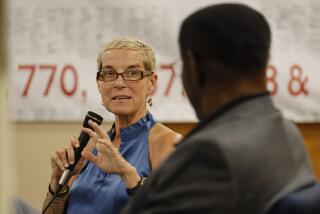Susan Okin, 57; Viewed Political Theory Through Feminist Prism
- Share via
Susan Moller Okin, a Stanford University political philosopher who brought a feminist perspective to the study of work and family issues, has died. She was 57.
Okin died March 3 at her home in Lincoln, Mass., where she was living during a one-year leave from Stanford. At the time of her death, she was a distinguished visiting professor at the Radcliffe Institute for Advanced Study at Harvard University.
Authorities said she apparently died of natural causes.
Okin, who joined the Stanford faculty in 1990, was the author of three books, the most acclaimed of which was “Women in Western Political Thought” (1979), an examination of assumptions about gender in the works of such political theorists as Plato, Aristotle, Rousseau and John Stuart Mill.
She also wrote “Justice, Gender and the Family” (1989), which dissected the inequities inherent in traditional families that assign women the role of primary nurturer and domestic caretaker; and “Is Multiculturalism Bad for Women?” (1999), which examined situations in which the claims of minority cultures or religions conflict with the best interests of women.
Okin’s most important contribution was to put a spotlight on the family in discussions of justice, according to Stanford associate professor of philosophy Debra Satz, who called her late colleague “perhaps the best feminist political philosopher in the world.”
“She viewed inequalities within the family as the linchpin of gender inequality, arguing that inequalities within the home worked to systematically disadvantage women in the economy and in the public sphere,” Satz said this week.
Born in Auckland, New Zealand, Okin grew up in a family of strong and intelligent women. She said this background had led her to question ideas about women presented in her history courses at the University of Auckland, where she earned a bachelor’s degree in 1966.
After receiving a master’s in philosophy from Oxford University in 1970, she moved to the United States for doctoral work at Harvard. Although an advisor told her that “women are not a topic,” she wrote her dissertation on what political theorists have said about women over the centuries. She earned her doctorate in 1975, then taught for 15 years at Brandeis University in Massachusetts.
Her first book, “Women in Western Political Thought,” expanded on the ideas she developed in her dissertation. In a review published in the Washington Post, Vivian Gornick called it an excellent book that exposed “the obvious illogic with which philosophers had to argue in order to exclude women from political equality.”
Her next book, “Justice, Gender and the Family,” questioned basic assumptions about gender roles and justice, arguing that justice begins at home.
“How can you grow up in an institution that is pervaded by injustice in very many ways, and become somebody who thinks about justice and goes out there in the world to try to institutionalize it?” she said in an interview with The Times in 1986.
Okin maintained that traditional family structures strongly influenced such crucial matters as divorce settlements.
Noting that, by the late 1980s, 70% of poor families were headed by divorced or separated women, she became a vocal proponent of divorce decrees that take into account the disparity in earning capacity between husbands and wives. She urged that a husband’s future earning power be considered an asset to be fairly divided after a marriage ends.
She also argued for changes in public policy and in the workplace to provide people with job flexibility and benefits that promote equal sharing of parental and household responsibilities.
Her last book drew attention to the rights of women in cultural or religious minorities. “Is Multiculturalism Bad for Women?” examined such issues as the “cultural defense” used in U.S. criminal cases, such as the claim by Hmong men who said rape is part of their cultural practice of marriage by capture, or those of Asian and Middle Eastern immigrants who believe that a wife’s adultery is sufficient cause to kill her.
Okin was also concerned about female genital mutilation practiced by some African cultures in the belief that it helps ensure women’s virginity and fidelity.
In recent years, Okin devoted her attention to the plight of women in underdeveloped countries. She traveled to India earlier this year with a delegation from the Global Fund for Women, a San Francisco-based foundation that supports women’s human rights.
Okin is survived by a daughter, Laura, of Boston; a son, Justin, of New York; and two sisters, Janice May of Auckland and Catherine Pitt of Nottingham, England. Memorial donations may be sent to the Global Fund for Women, 1375 Sutter St., Suite 400, San Francisco, CA 94109.
More to Read
Sign up for Essential California
The most important California stories and recommendations in your inbox every morning.
You may occasionally receive promotional content from the Los Angeles Times.














